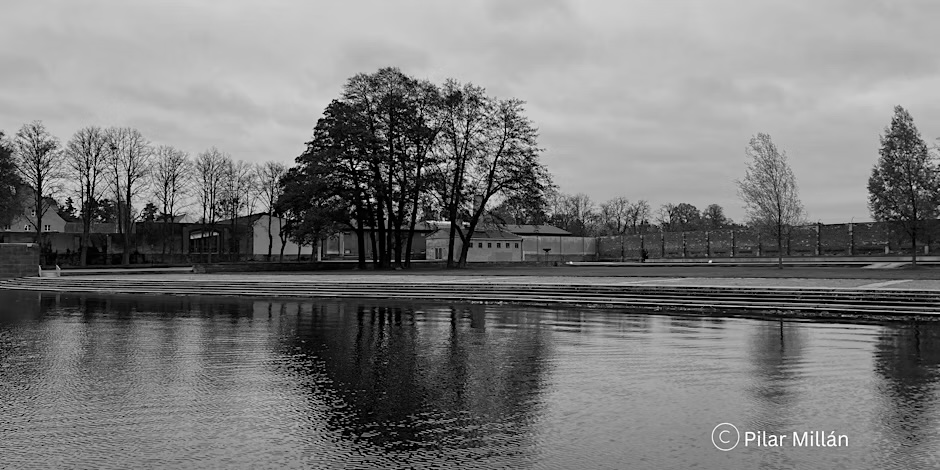The two-day programme Survival and Resistance. Violence against Women in War Conflicts and Concentration Camps pays tribute to the Spanish women deported to the Ravensbrück concentration camp, marking the 80th anniversary of its liberation. Curated by Piedad Solans in collaboration with EUROM and Amical de Ravensbrück, the event is part of Berlin Dialogues.The World Today by Instituto Cervantes Berlin.
Over the course of two days, experts from diverse disciplines will explore key themes such as exile and resistance, cultural diversity, and war crimes. The programme will delve into the politics of survival, memory, and justice, while examining how these historical experiences continue to shape the future of Europe.
These dialogues offer a much-needed reflection on the violence endured by women in times of war and captivity. Through testimony, solidarity, and the power of memory, women not only resisted oppression but transformed their suffering into a force of political denunciation against totalitarian regimes.
Entrance is free, but prior registration is required via this link.
The event will also be available via streaming — the access link will be shared shortly.
Backrgound reflection
Violence against women in wars and in concentration camps is an archaic form of domination—perpetuated over centuries, normalized through silence, erased by oblivion, and often legitimized by political and linguistic systems. Denied access to weapons, technologies, and the public sphere, women have historically been relegated to a position of submission. In conflict and captivity, this exclusion has been compounded by specific forms of violence: sexual assault, reproductive control, forced labor, and medical abuse—all enacted upon their bodies as instruments of power.
In concentration camps, where the machinery of extermination operated with chilling precision, women were not merely passive victims. Amid extreme conditions of dehumanization, hunger, and terror, they organized, resisted, and survived. They formed networks of solidarity, preserved elements of culture, practiced mutual care, and crafted strategies of endurance. Their resistance was not only physical, but deeply human—preserving dignity, identity, and memory in the face of annihilation.
How did they navigate this violent world? How did they survive the traumas of war, deportation, captivity, and liberation? And how did they carry forward these experiences in both authoritarian regimes and emerging democracies?
The camps were not homogenous spaces. Women of different nationalities, languages, political beliefs, and cultural backgrounds coexisted, sometimes in conflict, often in mutual dependence. This plurality created unique microcosms—harsh, yet capable of fostering profound acts of solidarity and humanity. These stories have shaped Europe in ways we are only beginning to fully understand.
Defying their defenselessness, many women refused silence. They bore witness, not only to survive, but to testify. Their voices challenged the terror of totalitarian systems. They transformed suffering into political resistance and memory into a form of justice.
Agenda
April 29, 2025 | 7:00 PM
Instituto Cervantes Berlin, Rosenstr. 18, 10178 Berlin
Roundtable and Film Screening
Participants: Dr. Andrea Genest, Dr. Insa Eschebach, Dr. Luiza Iordache Cârstea, Dr. Mar Trallero Cordero, Pilar Millán, and Dr. Piedad Solans (moderator)
Film: Das Sediment (2025). Since discovering the existence of Ravensbrück—the only Nazi concentration camp for women—and the history submerged in the lake beside it, Pilar Millán has been immersed in a long-term, unpublished project in homage to the prisoners. This work now culminates in the premiere of her new video, Das Sediment (2025).
April 30, 2025 | 7:00 PM
Instituto Cervantes Berlin, Rosenstr. 18, 10178 Berlin
Roundtable
Participants: Dr. Helga Amesberger, Dr. Ottmar Ette, Dr. Regina Mühlhäuser, and Marc Wrasse (moderator)
More information here
Download the full programme here
Survey
This activity is co-financed by the European Commission and for its evaluation we kindly ask your collaboration in filling out this survey. It will take about 10 minutes, and you will need the information indicated below. Thank you very much!
- Reference of the Project: 101194553
- Type of activity: Awareness-Raising
- Title: Networking
- Duration of the event in days: 2
- Hybrid
- Instituto Cervantes Berlín

